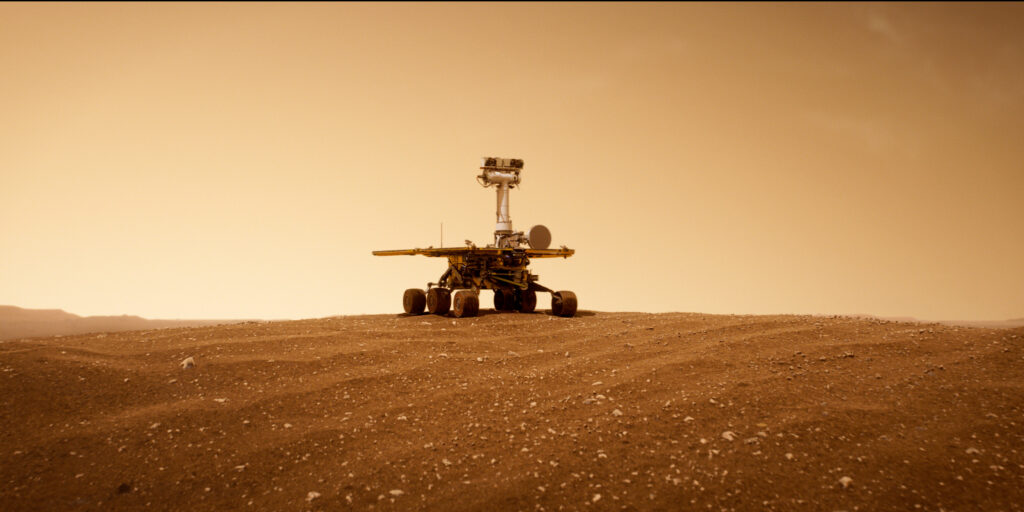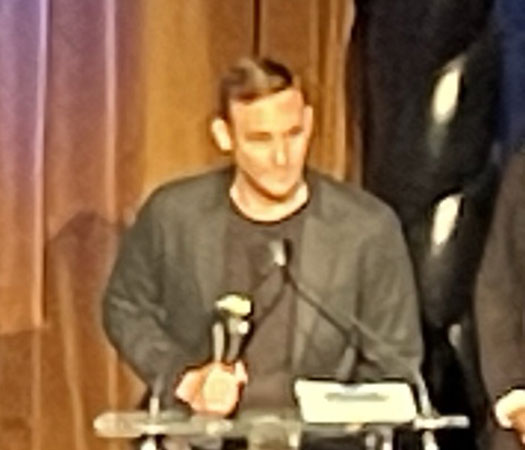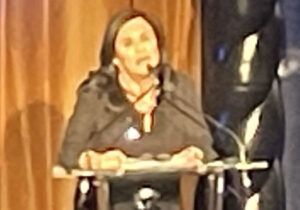November 10, 2022
by Carla Hay

With five prizes, the Mars exploration movie “Good Night Oppy” was the top winner at the Seventh Annual Critics Choice Documentary Awards, which were presented at the Edison Ballroom in New York City, on November 13, 2022. “Good Night Oppy” (from Amazon Studios) earned the awards for Best Documentary Feature, Best Director (for Ryan White), Best Musical Score (for Blake Neely), Best Narration and Best Science/Nature Documentary. “Good Night Oppy” (which tells the story of how NASA sent two robots to explore Mars, beginning in 2003) ended up winning five of the six awards for which it was nominated.
In one of his many acceptance speeches, “Good Night Oppy” director White thanked his colleagues and NASA. He also commented when comparing Earth to Mars, “I hope that this film can be a reminder of what can happen to our planet if we don’t treat it with the care it deserves.”

The only other documentary to win more than one prize at the ceremony was the Disney+ three-episode series “The Beatles: Get Back,” which won two awards: Best Limited Documentary Series and Best Music Documentary. “The Beatles: Get Back” (directed by Peter Jackson) is a restored and extended version of the 1970 Beatles documentary “Let It Be,” which was originally directed by Michael Lindsay-Hogg.
“Fire of Love” (from National Geographic Documentary Films/Neon), a movie directed by Sara Dosa about married French volcanologists Maurice Kraftt and Katia Kraftt, went into the ceremony as the top contender, with seven nominations. In the end, “Fire of Love” got one award: Best Archival Documentary.
The 2022 Critics Choice Documentary Awards is presented and voted on by the Critics Choice Association. Grammy-nominated performer/writer Wyatt Cenac hosted the show, which was livestreamed for the first time on Facebook Live and Instagram Live.
The Critics Choice Documentary Awards had some other first milestones in 2022. It was the first time that the show was held in the New York City borough of Manhattan, after previously being held in the New York City borough of Brooklyn. In addition, two categories—Best Ongoing Documentary Series and Best Limited Documentary Series—that have traditionally been included in the Critics Choice Real TV Awards are, as of 2022, now being presented at the Critics Choice Documentary Awards.
Another big change to the show in 2022 was the announcement of the two films that came in second place and third place in votes for the category of Best Documentary Feature. Second place went to “Fire of Love,” while third place went to Warner Bros. Pictures’ “Navalny,” a movie about Russian political activist Alexei Navalny and his investigation into who poisoned him in 2020. The second-place and third-place documentaries were announced before the winner of Best Documentary Feature.
The ceremony also included two non-competitive prizes, whose recipients were announced weeks before the show took place. Oscar-winning documentarian Barbara Kopple (“Harlan County USA” and “American Dream”) was bestowed with the Pennebaker Award (formerly known as the Critics Choice Lifetime Achievement Award), which was presented to her by D.A. Pennebaker’s widow/filmmaking partner, Chris Hegedus.
In her speech, Kopple thanked her longtime friends Pennebaker and Hegedus for being her mentors, and she expressed gratitude for people in the documentary filmmaking community. Kopple, who began making films in the 1970s, said in her speech that critics play a crucial role in whether or not documentaries can get distribution and find an audience. “I remember when critics wouldn’t even look at documentaries,” Kopple said. “I thank you from the bottom of my heart. All we want is to be able to tell a good story.”
Meanwhile, Dawn Porter (“John Lewis: Good Trouble”) received the Critics Choice Impact Award, given to documentarians whose work is about promoting changes for the better in society. Disney’s Onyx Collective head of documentary programming Jacqueline Glover presented Porter with this award. In her speech, Porter remembered the leap of faith that she took to leave a secure full-time job to make her first documentary, 2013’s “Gideon’s Army.” She thanked her documentary subjects and people she has collaborated with over the years.
Presenters at the show also included style entrepreneur/film producer Kathy Ireland, actor Richard Kind, musician/actor Paul Shaffer, actress Soshana Bean, actor Jeremy Sisto, “Good Night Oppy” director White, actress Tamara Tunie, filmmaker Tonya Lewis Lee, filmmaker Andrew Jarecki, musician Willie Colón, actor Erich Bergen and actress/singer Idina Menzel.
Here is the complete list of winners and nominees for the 2022 Critics Choice Documentary Awards:
*=winner
BEST DOCUMENTARY FEATURE
- Aftershock (Hulu)
- The Automat (A Slice of Pie Productions)
- Descendant (Netflix)
- Fire of Love (National Geographic Documentary Films/Neon)
- Gabby Giffords Won’t Back Down (Briarcliff Entertainment)
- Good Night Oppy (Amazon Studios)*
- The Janes (HBO)
- Moonage Daydream (HBO/Neon)
- Navalny (HBO/CNN/Warner Bros. Pictures)
- Sidney (Apple TV+)
BEST DIRECTOR
- Judd Apatow, Michael Bonfiglio – George Carlin’s American Dream (HBO)
- Margaret Brown – Descendant (Netflix)
- Sara Dosa – Fire of Love (National Geographic Documentary Films/Neon)
- Reginald Hudlin – Sidney (Apple TV+)
- Brett Morgen – Moonage Daydream (HBO/Neon)
- Laura Poitras – All the Beauty and the Bloodshed (HBO/Neon)
- Daniel Roher – Navalny (HBO/CNN/Warner Bros. Pictures)
- Ryan White – Good Night Oppy (Amazon Studios)*
BEST FIRST DOCUMENTARY FEATURE
- Andrea Arnold – Cow (IFC Films)
- Lisa Hurwitz – The Automat (A Slice of Pie Productions)
- Jono McLeod – My Old School (Magnolia Pictures)
- Amy Poehler – Lucy and Desi (Amazon Studios)
- Alex Pritz – The Territory (National Geographic Documentary Films)
- David Siev – Bad Axe (IFC Films)*
- Bianca Stigter – Three Minutes: A Lengthening (Neon)
BEST CINEMATOGRAPHY
- Benjamin Bernhard, Riju Das – All That Breathes (HBO)
- Magda Kowalczyk – Cow (IFC Films)
- Lucas Tucknott – McEnroe (Showtime)
- Gabriela Osio Vanden, Jack Weisman, Sam Holling – Nuisance Bear (The New Yorker)
- The Cinematography Team – Our Great National Parks (Netflix)*
- Alex Pritz, Tangãi Uru-eu-wau-wau – The Territory (National Geographic Documentary Films)
BEST EDITING
- Jabez Olssen – The Beatles: Get Back (Disney+)
- Erin Casper, Jocelyne Chaput – Fire of Love (National Geographic Documentary Films/Neon)
- Joe Beshenkovsky – George Carlin’s American Dream (HBO)
- Helen Kearns, Rejh Cabrera – Good Night Oppy (Amazon Studios)
- Brett Morgen – Moonage Daydream (HBO/Neon)*
- Langdon Page, Maya Daisy Hawke – Navalny (HBO/CNN/Warner Bros. Pictures)
- Katharina Wartena – Three Minutes: A Lengthening (Neon)
BEST SCORE
- Hummie Mann – The Automat (A Slice of Pie Productions)
- Nicolas Godin – Fire of Love (National Geographic Documentary Films/Neon)
- Blake Neely – Good Night Oppy (Amazon Studios)*
- Max Avery Lichtenstein – The Janes (HBO)
- David Schwartz – Lucy and Desi (Amazon Studios)
- Marius de Vries, Matt Robertson – Navalny (HBO/CNN/Warner Bros. Pictures)
BEST NARRATION
- Deep in the Heart: A Texas Wildlife Story (Fin and Fur Films) – Written by Ben Masters; Performed by Matthew McConaughey
- Fire of Love (National Geographic Documentary Films/Neon) – Written by Shane Boris, Erin Casper, Jocelyne Chaput, Sara Dosa. Performed by Miranda July
- Good Night Oppy (Amazon Studios) –Written by Helen Kearns, Ryan White; Performed by Angela Bassett*
- Our Great National Parks (Netflix) – Performed by Barack Obama
- Riotsville, U.S.A. (Magnolia Pictures) – Written by Tobi Haslett; Performed by Charlene Modeste
- Three Minutes: A Lengthening (Neon) – Written by Bianca Stigter; Performed by Helena Bonham Carter
BEST ARCHIVAL DOCUMENTARY
- The Beatles: Get Back (Disney+)
- Fire of Love (National Geographic Documentary Films/Neon)*
- Moonage Daydream (HBO/Neon)
- Nothing Compares (Showtime)
- Riotsville, U.S.A. (Magnolia Pictures)
- Three Minutes: A Lengthening (Neon)
BEST HISTORICAL DOCUMENTARY
- The Automat (A Slice of Pie Productions)
- Descendant (Netflix)*
- The Janes (HBO)
- Lowndes County and the Road to Black Power (Peacock)
- Still Working 9 to 5 (Mighty Fine Entertainment)
- Three Minutes: A Lengthening (Neon)
- The U.S. and the Holocaust (PBS)
BEST BIOGRAPHICAL DOCUMENTARY
- George Carlin’s American Dream (HBO)
- The Last Movie Stars (HBO Max)
- Lucy and Desi (Amazon Studios)
- The Rebellious Life of Mrs. Rosa Parks (Peacock)
- Salvatore: Shoemaker of Dreams (Sony Pictures Classics)
- Sidney (Apple TV+)*
- Sr. (Netflix)
BEST MUSIC DOCUMENTARY
- The Beatles: Get Back (Disney+)*
- Hallelujah: Leonard Cohen, a Journey, a Song (Sony Pictures Classics)
- If These Walls Could Sing (Disney Original Documentary)
- Louis Armstrong’s Black & Blues (Apple TV+)
- Moonage Daydream (HBO/Neon)
- Nothing Compares (Showtime)
- The Return of Tanya Tucker – Featuring Brandi Carlile (Sony Pictures Classics)
BEST POLITICAL DOCUMENTARY
- Aftershock (Hulu)
- All the Beauty and the Bloodshed (HBO/Neon)
- Gabby Giffords Won’t Back Down (Briarcliff Entertainment)
- The Janes (HBO)
- Navalny (HBO/CNN/Warner Bros. Pictures)*
- Retrograde (National Geographic Documentary Films)
- Freedom on Fire: Ukraine’s Fight for Freedom (Netflix)
BEST SCIENCE/NATURE DOCUMENTARY
- All That Breathes (HBO)
- Cow (IFC Films)
- Fire of Love (National Geographic Documentary Films/Neon)
- Good Night Oppy (Amazon Studios)*
- Nuisance Bear (The New Yorker)
- Return to Space (Netflix)
- The Territory (National Geographic Documentary Films)
BEST SPORTS DOCUMENTARY
- Citizen Ashe (Magnolia/HBO)* (tie)
- Hockeyland (Greenwich Entertainment)
- Kaepernick & America (Dark Star Pictures)
- McEnroe (Showtime)
- The Redeem Team (Netflix)
- Welcome to Wrexham (FX/Hulu)* (tie)
BEST SHORT DOCUMENTARY
- 38 at the Garden (HBO)
- Angola Do You Hear Us? Voices From a Plantation Prison (MTV Documentary Films)
- The Flagmakers (National Geographic Documentary Films)
- Four Seasons Total Documentary (MSNBC)
- My Disability Roadmap (The New York Times Op Docs)
- Nuisance Bear (The New Yorker)*
- Stranger at the Gate (The New Yorker)
BEST LIMITED DOCUMENTARY SERIES
- The Beatles: Get Back (Disney+)*
- Hostages (HBO)
- The Last Movie Stars (HBO Max)
- The Lincoln Project (Showtime)
- Our Great National Parks (Netflix)
- The U.S. and the Holocaust (PBS)
- We Need to Talk About Cosby (Showtime)
BEST ONGOING DOCUMENTARY SERIES
- 30 for 30 (ESPN)*
- American Masters (PBS)
- Cheer (Netflix)
- The Circus (Showtime)
- Unsolved Mysteries (Netflix)
- Welcome to Wrexham (FX/Hulu)




